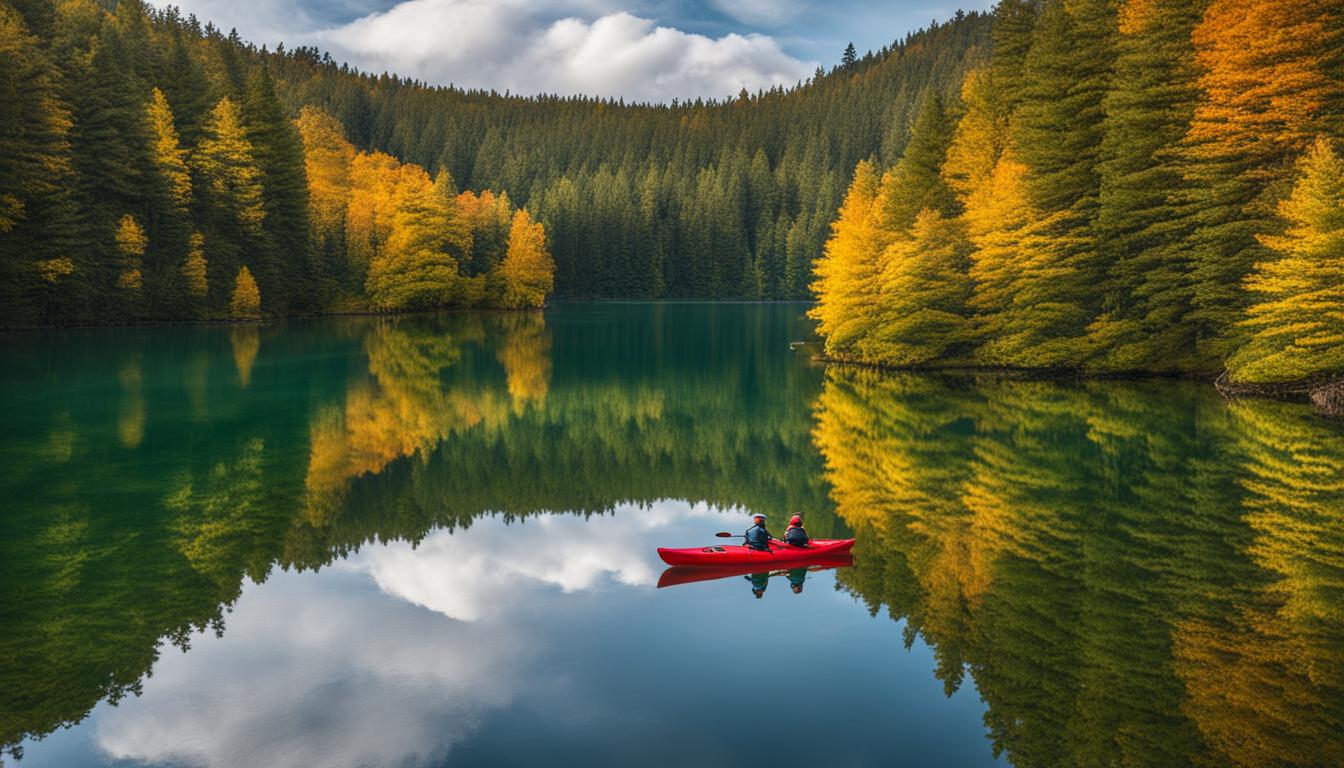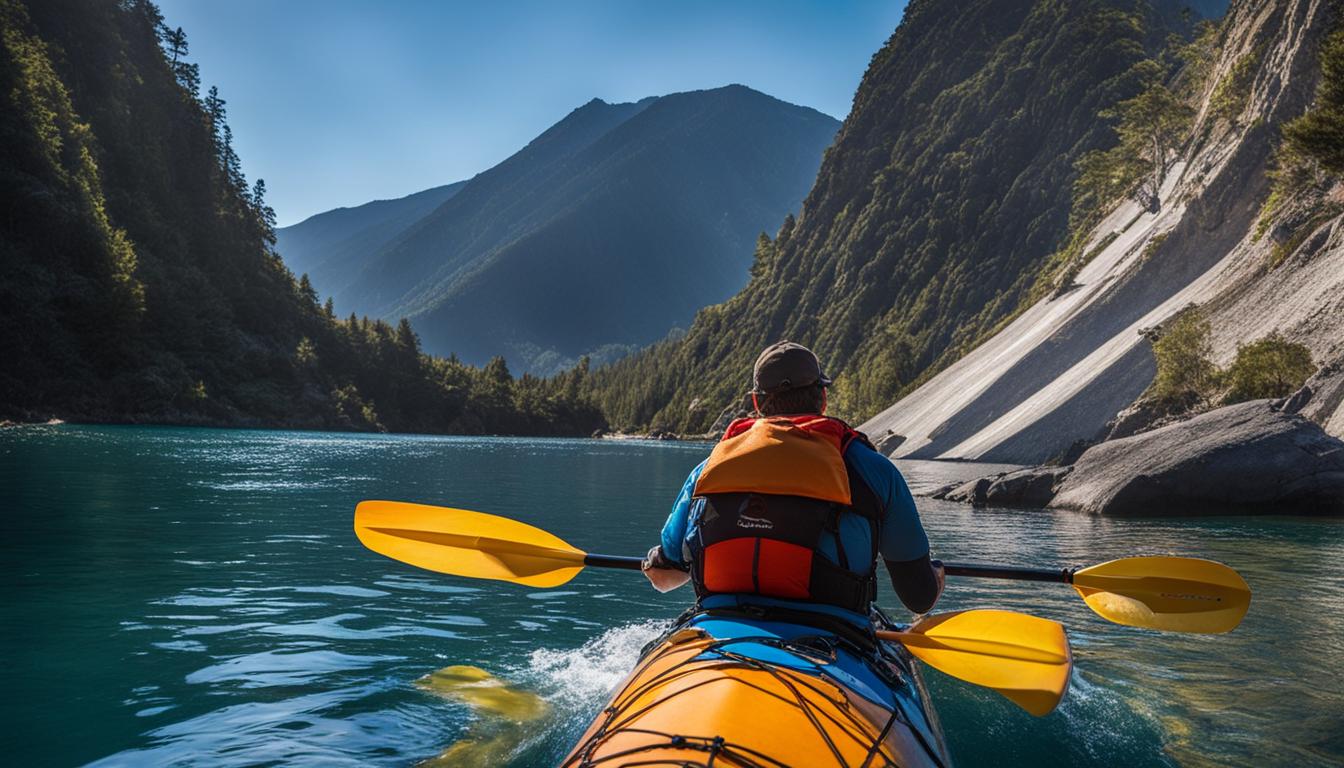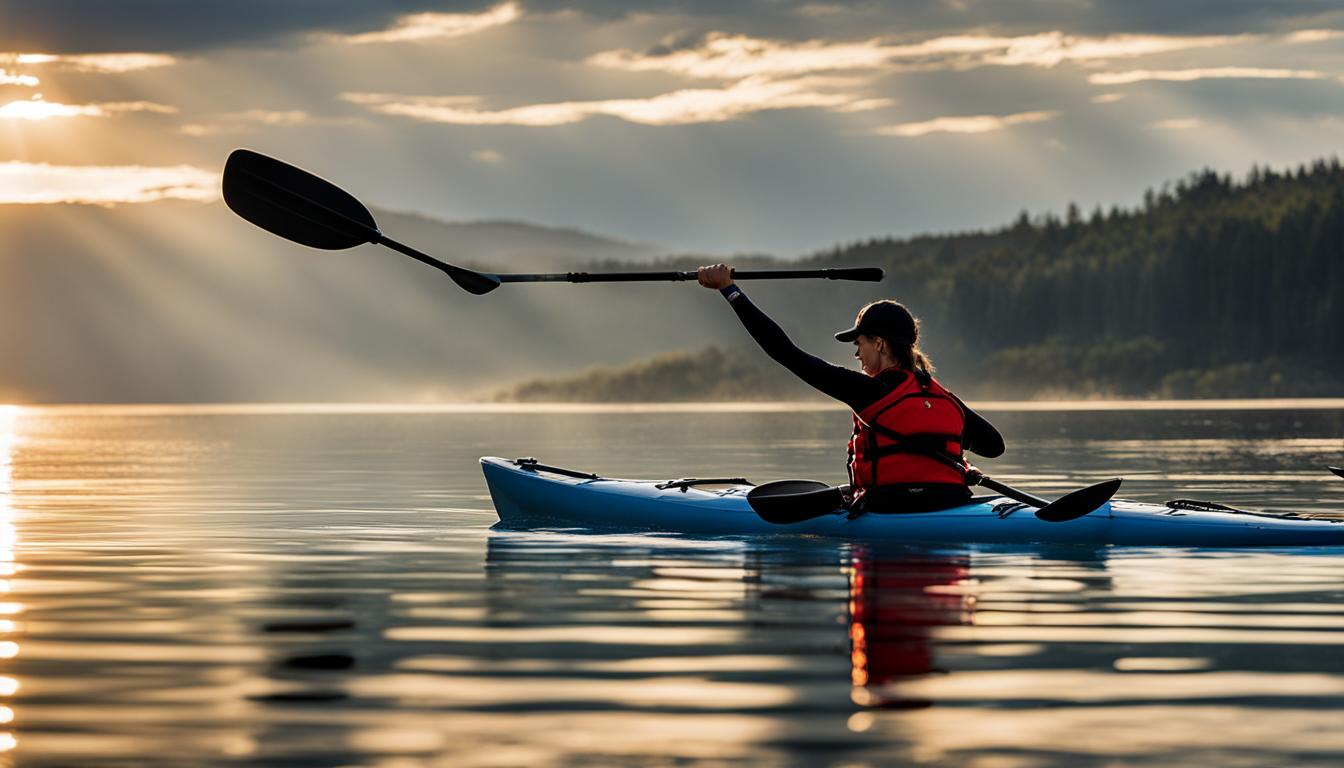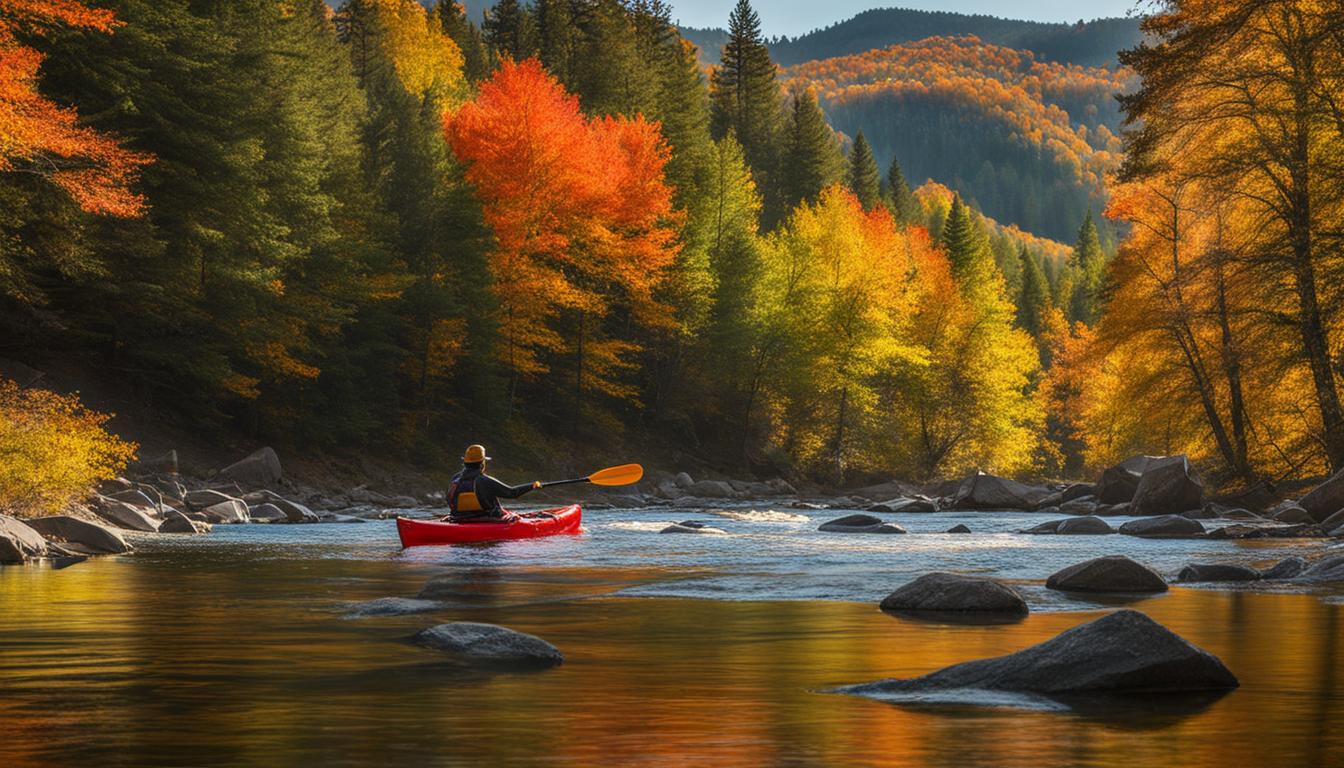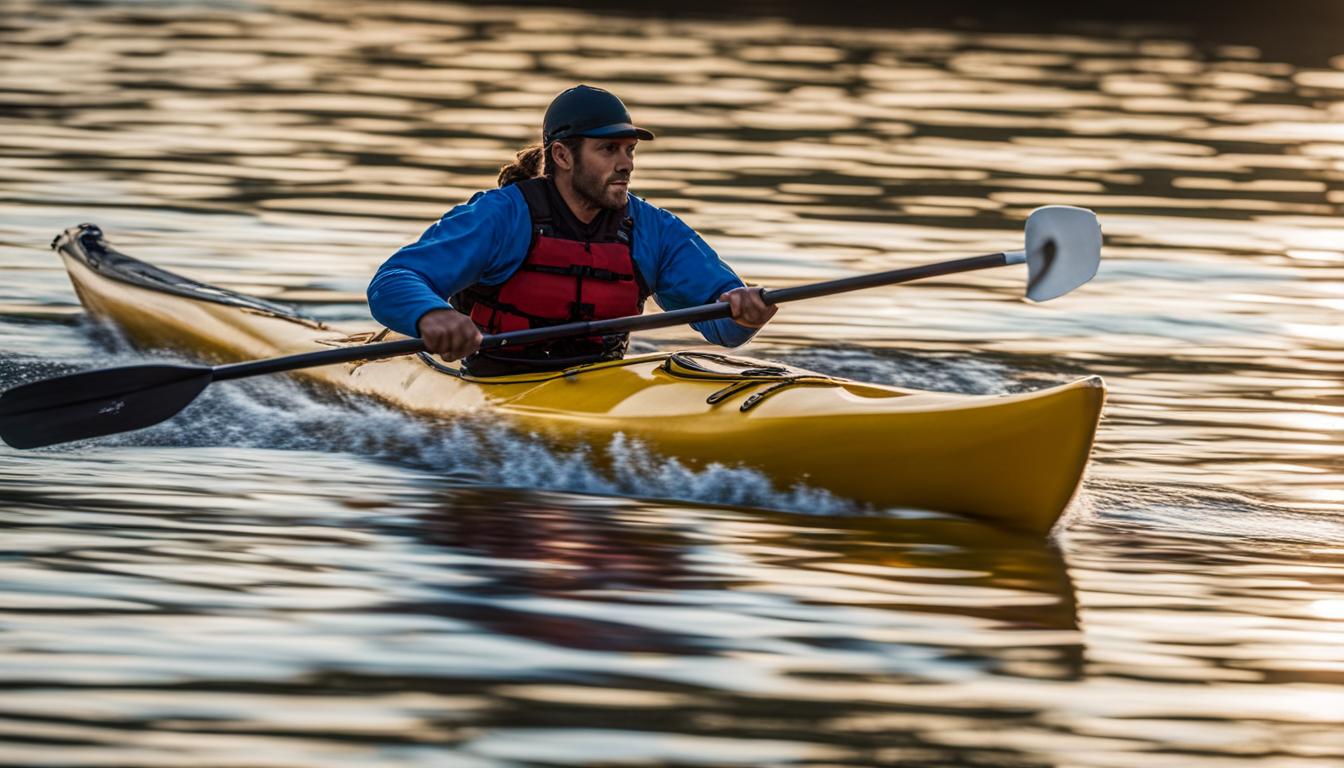Kayaking is a popular recreational activity that can be enjoyed in various regions across the United States. The best time to go kayaking depends on factors such as location, weather conditions, and water temperature. While kayaking can be enjoyed year-round in some regions, the optimal seasons for kayaking are generally in the spring, summer, and autumn months. It is important to consider the specific kayaking destination and its climate when planning a kayaking trip.
Key Takeaways:
- Optimal kayaking seasons are generally in the spring, summer, and autumn months.
- Consider the specific kayaking destination and its climate when planning a trip.
- Warmer air temperatures in spring and summer provide more comfortable kayaking experiences.
- Check local weather trends and water conditions before planning a kayaking trip.
- Certain destinations may be less crowded during the off-season for a more peaceful experience.
Understanding the Factors Affecting Kayaking Seasons
When planning a kayaking trip, it’s essential to understand the various factors that influence the optimal kayaking seasons in different regions. By considering these factors, you can ensure a safe and enjoyable experience on the water. Let’s explore the key elements that affect kayaking conditions:
Air and Water Temperature
The temperature of the air and water plays a crucial role in determining the best time to go kayaking. Warmer air temperatures in spring and summer offer more comfortable conditions for paddling. Additionally, warmer water temperatures ensure a pleasant experience and reduce the risk of hypothermia. As autumn approaches, the air and water temperatures may start to cool down, so it’s important to pack appropriate clothing and gear to stay warm.
Flow Rate and Water Currents
Flow rate, particularly important for whitewater kayaking, can significantly impact the difficulty and safety of your kayaking adventure. Higher water flow rates can create faster-moving currents and more challenging conditions, requiring advanced skills and experience. It’s crucial to check the flow rate and water level before heading out, as they can fluctuate depending on rainfall and other environmental factors.
Daylight Hours and Weather Patterns
The length of daylight hours and prevailing weather patterns also influence the kayaking experience. Longer daylight hours in spring and summer allow for more time to explore and enjoy the water. Additionally, it’s essential to monitor weather patterns for any potential storms or adverse conditions that may affect your safety. Always check the local forecasts and be prepared for changes in weather during your kayaking excursion.
By understanding these factors, you can better plan your kayaking trips and ensure a safe and enjoyable experience. Remember to check regional kayaking conditions, consult a kayaking climate guide, and follow season-specific kayaking tips to make the most of your adventures on the water.
Best Times to Kayak in Different US States
When planning a kayaking trip, it’s essential to choose the right time of year. The ideal kayaking months may vary depending on the state and region you plan to visit. Understanding the peak kayaking season and weather trends for kayakers will help you plan a successful and enjoyable adventure.
Seasonal Considerations
Each state has its own unique climate and weather patterns, which affect the best times for kayaking. In general, early spring through late summer is considered prime kayaking season in many states. States like California, Florida, and Hawaii, known for their warm weather year-round, offer kayaking opportunities throughout the year. On the other hand, states with colder climates, such as Alaska and Minnesota, have shorter kayaking seasons that typically start in late spring and end in early autumn. Before embarking on your kayaking trip, check the local weather forecasts and trends to ensure favorable conditions.
Kayak Trip Planning by Season
Planning your kayak trip based on the season can help you make the most of your experience. In the spring, you’ll find rivers and lakes filled with the vibrant colors of blooming flowers and lush greenery. Summer offers longer daylight hours and warmer temperatures, making it ideal for longer kayaking expeditions. Fall brings picturesque foliage and cooler temperatures, creating a scenic backdrop for your kayaking adventure. Consider these seasonal factors when choosing the best time to kayak in a specific state or region.
| State | Ideal Kayaking Months |
|---|---|
| California | April – September |
| Florida | Year-round |
| Maine | June – September |
| Minnesota | June – August |
| New York | May – September |
| Texas | March – October |
Peak Kayaking Season Guide
For a memorable kayaking experience, consider visiting popular kayaking destinations during their peak season. This is when the weather conditions are most favorable and the waterways are ideal for paddling. Keep in mind that peak seasons may also mean more crowds, so plan accordingly. Some notable peak kayaking seasons include:
- Everglades National Park, Florida: November – April
- San Juan Islands, Washington: June – September
- Adirondack Park, New York: June – September
- Glacier Bay, Alaska: June – August
By considering the ideal kayaking months, planning your kayak trip by season, and exploring peak kayaking destinations, you can make the most of your kayaking adventure in different US states. Remember to always check weather conditions and be prepared with the necessary gear and equipment for a safe and enjoyable experience.
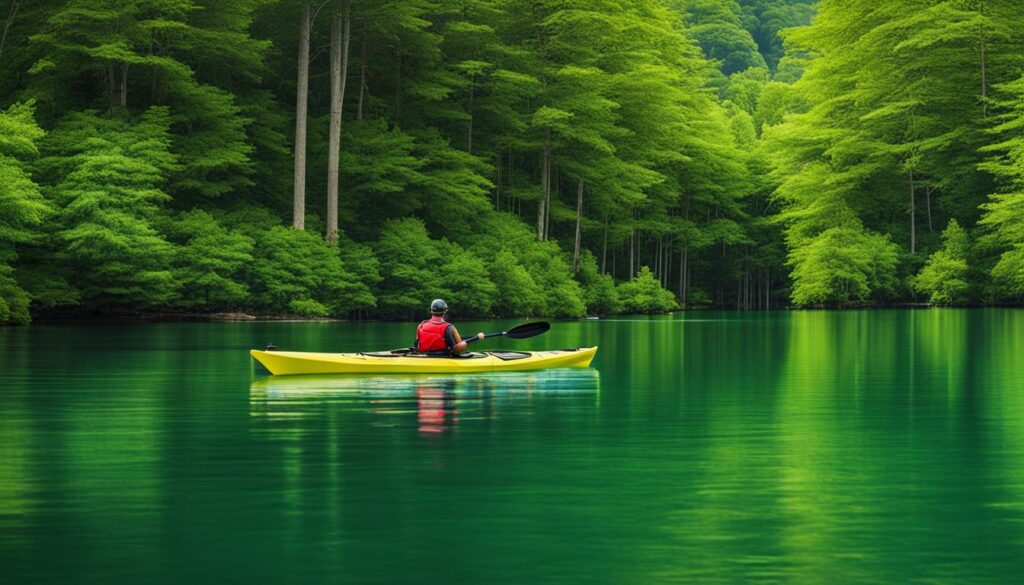
Top Kayaking Destinations in the US
Kayaking enthusiasts in the United States are spoiled for choice when it comes to stunning destinations to explore on the water. Whether you prefer calm lakes or adventurous rivers, there is something for everyone. Here are some of the top kayaking destinations in the country:
1. Everglades National Park, Florida
Known as the “River of Grass,” the Everglades is a unique and diverse ecosystem that offers incredible kayaking opportunities. Paddle through mangrove tunnels, spot alligators, manatees, and a variety of bird species, and immerse yourself in the tranquility of this vast wilderness.
2. Apostle Islands National Lakeshore, Wisconsin
The Apostle Islands are a kayaker’s paradise with a captivating blend of pristine beaches, sea caves, and historic lighthouses. Explore the shoreline of Lake Superior, navigate through the breathtaking sea caves, and witness the beauty of the crystal-clear waters.
3. Kenai Fjords National Park, Alaska
Immerse yourself in the rugged beauty of Alaska’s Kenai Fjords National Park. Kayak among towering glaciers, watch for wildlife such as humpback whales and sea otters, and be awe-struck by the stunning scenery of majestic mountains and icy fjords.
4. Boundary Waters Canoe Area Wilderness, Minnesota
The Boundary Waters is a true wilderness adventure, offering over a thousand lakes and countless miles of pristine waterways to explore. Paddle through interconnected lakes, camp on secluded islands, and reconnect with nature in this remote and picturesque destination.
| Destination | Location | Unique Features |
|---|---|---|
| Everglades National Park, Florida | Southern Florida | Mangrove tunnels, alligators, manatees |
| Apostle Islands National Lakeshore, Wisconsin | Lake Superior, northern Wisconsin | Sea caves, pristine beaches, historic lighthouses |
| Kenai Fjords National Park, Alaska | Kenai Peninsula, Alaska | Towering glaciers, humpback whales, icy fjords |
| Boundary Waters Canoe Area Wilderness, Minnesota | Northern Minnesota | Remote wilderness, interconnected lakes |
These destinations offer a range of experiences for kayakers of all levels. Whether you seek adventure, wildlife encounters, or simply a peaceful escape into nature, these top kayaking destinations in the US have it all. Embark on your own kayaking adventure and create unforgettable memories in some of the most spectacular natural settings the country has to offer.
Conclusion
Kayaking is a versatile outdoor activity that can be enjoyed year-round in different regions of the United States. The best time for kayaking varies depending on factors such as location, weather conditions, and water temperature.
Spring, summer, and autumn typically offer the most comfortable and enjoyable experiences for kayakers. During these seasons, you can expect warmer air temperatures and longer daylight hours, making it ideal for exploring the beautiful waterways across the country.
However, it’s important to stay updated on weather trends and local conditions before embarking on a kayaking trip. Checking the forecast and water conditions will ensure your safety and help you plan accordingly. Additionally, investing in the right gear and equipment, such as a wetsuit or drysuit for colder temperatures or a sun hat and sunscreen for warmer climates, will enhance your kayaking experience.
So whether you’re paddling through the Everglades in Florida or gliding along the pristine waters of Kenai Fjords National Park in Alaska, always keep an eye on the weather trends for kayakers. By doing so, you’ll be able to make the most of your kayaking adventure and create unforgettable memories in some of the most breathtaking natural landscapes in the United States.
FAQ
What is the best time to go kayaking?
The best time to go kayaking depends on factors such as location, weather conditions, and water temperature.
What factors influence the kayaking seasons?
Air temperature, water temperature, flow rate, and daylight hours all play a role in determining the ideal time for kayaking.
How long is the kayaking season in different regions of the United States?
The kayaking season varies by state and region, but generally early spring through late summer is considered the best time for kayaking in many states.
Can kayaking be enjoyed year-round in all states?
While kayaking can be enjoyed year-round in some states like Florida and Hawaii, in colder climates like Alaska and Minnesota, the kayaking season may start later in spring and end earlier in autumn.
What are some popular kayaking destinations in the United States?
Some popular kayaking destinations include Everglades National Park in Florida, Apostle Islands National Lakeshore in Wisconsin, Kenai Fjords National Park in Alaska, and Boundary Waters Canoe Area Wilderness in Minnesota.
What should I consider when planning a kayaking trip?
It is important to consider the specific details and regional weather patterns when planning a kayaking trip. Always stay updated on weather trends and be prepared with the appropriate gear and equipment for a successful kayaking adventure.

